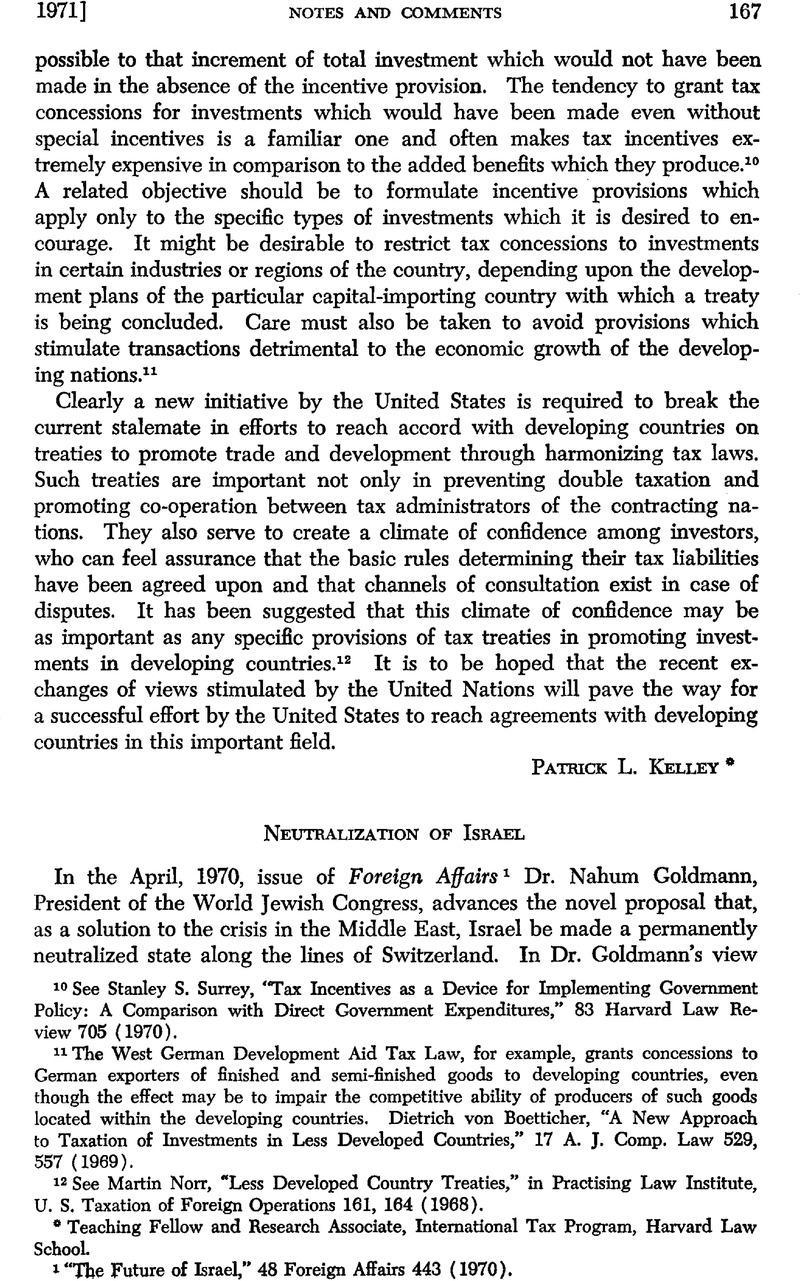No CrossRef data available.
Published online by Cambridge University Press: 28 March 2017

1 “The Future of Israel” 48 Foreign Affairs 443 (1970).
2 For an excellent and exhaustive study of the political, as well as many of the legal problems of neutralization, see Black, Falk, Knorr, and Young, , Neutralization and World Politics (1968)Google Scholar.
3 See, generally, Black, op. cit. note 2 above; 1 Whiteman, , Digest of International Law 342–364 (1963)Google Scholar; Kunz, , “Austria’s Permanent Neutrality,” 50 A.J.I.L. 418 (1956)CrossRefGoogle Scholar.
4 A distinction is usually drawn between “neutralization” and “neutrality.” Neutrality is defined as a voluntary policy that a state may adopt in time of war with respect to belligerents. Neutralization, on the other hand, refers to a permanent status, acquired by agreement with other states, which cannot be relinquished without their consent. “Permanent neutrality” is often used in the same sense as neutralization. See 1 Whiteman, op. cit. note 3 above, at 342–343.
Arguably, Austria should be classified as an example of neutrality instead of neutralization because the State Treaty with Austria contains no reference to Austria’s neutralization. Rather, the terms of Austria’s neutralization are found in a Constitutional Federal Statute enacted by the Austrian Parliament. It has been contended, however, that the Austrian statute is more than a unilateral declaration of policy because (a) it was enacted pursuant to an international obligation, the so–called Moscow Memorandum of April 15, 1955, between Austria and the Soviet Union, and (b) the neutralization of Austria has been generally recognized by states members of the international community. See Kunz, loc. cit. note 3 above, at 419–422.
5 In 1961 the Soviet Union repeatedly warned the Austrian Government that its application for association with the European Economic Community would be regarded as a violation of Austrian neutrality and the prohibition of the Austrian State Treaty against political or economic union with Germany. The Austrian Government rejected these protests on Oct. 2, 1961, in a note to the Soviet Union. 1 Whiteman, op. cit. note 3 above, at 352–353.
6 Switzerland has consistently refused to become a Member of the United Nations on the ground the collective security system, operating through the Security Council, might require it to take positions incompatible with its permanent neutrality in the event of armed conflicts. On the other hand, for a view that there are no legally valid objections to the membership of a neutralized state in the United Nations, see Verdross, , “Austria’s Permanent Neutrality and the United Nations Organization,” 50 A.J.I.L. 61 (1956)CrossRefGoogle Scholar.
7 See 1 Whiteman, op. cit. note 3 above, at 350.
8 For a draft model treaty of neutralization, see Black, Falk, Knorr and Young, op. cit. note 2 above, at 191–195.
9 1 Oppenheim, , International Law 966–967 (8th ed., Lauterpacht, 1955)Google Scholar.
10 See Dommen, Conflict in Laos: The Politics of Neutralization 247–250 (1964), for a discussion of the failure of the Commission to control the conflict.